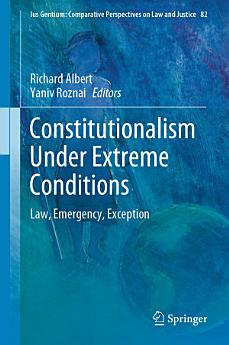Constitutionalism Under Extreme Conditions: Law, Emergency, Exception
About this ebook
About the author
Richard Albert, the William Stamps Farish Professor in Law and Professor of Government at the University of Texas at Austin, has published over 85 scholarly works on constitutionalism, including his most recent book “Constitutional Amendments: Making, Breaking, and Changing Constitutions” (OUP 2019). He has held visiting faculty appointments at Yale University, the University of Toronto, FGV Direito SP in Brazil, the Externado University of Colombia, and the Interdisciplinary Center in Israel. A graduate of Yale, Oxford and Harvard, he is a former law clerk to the Chief Justice of Canada, a founding Co-Editor of I-CONnect, and the founding Director of the International Forum on the Future of Constitutionalism.
Yaniv Roznai, Associate Professor at the Harry Radzyner Law School, Interdisciplinary Center (IDC) Herzliya, is the leading authority on the theory and doctrine of unconstitutional constitutional amendment. He is a graduate of IDC and the London School of Economics, where he obtained his PhD that was awarded the European Group of Public Law’s Thesis Prize. He has held fellowships at Princeton University, New York University and the University of Haifa. His books include “Unconstitutional Constitutional Amendments - The Limits of Amendment Powers” (OUP, 2017), which was awarded the Inaugural International Society for Public Law (ICONS) Book Prize, and "Constitutional Revolution" (Yale University Press, 2020) (with Gary Jacobsohn).









